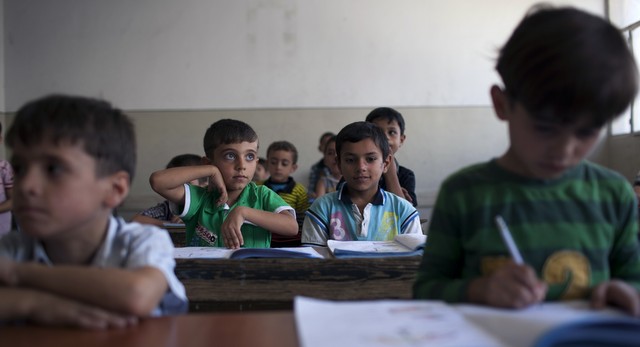As the international community pushes for a political solution in the Syrian conflict, the design of detailed plans for political, economic, and social transformation becomes more urgent. Any such plans should include a comprehensive reform of the Syrian primary and secondary education system. These schools target around 40 percent of the country’s total population, and they are where Syrians from all walks of life spend their formative years.
The school system is a crucial incubator of social and cultural understanding in any country. In Syria, however, the education system has failed at this task—notably when it comes to Islamic education. The effects of this failure are keenly felt today as Syria suffers sectarian conflict and a surge of religious intolerance.
No Room for non-Sunni Islam
The overwhelming majority of the Syrian population is Sunni Muslim, but around one-quarter of the population is made up of a combination of Christian minorities and Shia-affiliated sects, including Alawites, Druze, Ismailis, and Twelver Shia Muslims. While Christian children are allowed their own religious education, all Muslim children in public school study a particular strand of Sunni Islam from grade one through grade twelve for two to three hours a week, regardless of which interpretation of Islam their own family follows.
After Syrian President Bashar al-Assad assumed the presidency in 2000, the school curricula and textbooks were revised. However, the new editions of the Islamic religious education texts continued to present Islam as a monolithic religion, disregarding the different Sunni schools of thought as well as the beliefs and rituals of other Muslim sects—particularly the Alawites and the Shia. Muslim schoolchildren were not taught to accept diversity among Islamic sects since the texts presented only one “true” strand: mainstream Sunni Islam.
The textbooks, for example, glorified the lives and achievements of the companions of the Prophet Muhammad, such as Abu Bakr and Umar ibn al-Khattab. But these companions are highly controversial within the Shia community, which accuses them of robbing the Prophet’s cousin, Ali ibn Abi Talib, of his “legitimate” right to succeed the Prophet in political leadership (khilafa).
The Prophet’s wife Aisha, daughter of Abu Bakr, is another contested figure. She is described in the ninth-grade textbook as the Mother of Believers (Umm al-Mumineen) and as a role model for Muslims, particularly women. According to the textbook, Aisha was very knowledgeable, pious, generous, and a leader in defending women’s rights. Shia Muslims mostly deny her these attributes and accuse her of fomenting sedition among Muslims by leading armed men in the Battle of the Camel against Ali ibn Abi Talib, an event that is not mentioned in the Syrian textbooks.
Such texts obviously do not help minority students develop a profound understanding of their own faith. And by erasing non-Sunni versions of Islam, the school system has failed to foster acceptance and mutual understanding between Syria’s religious faiths.
Instead of Secularism, a Sunni-Infused Arabism
The “secular” regimes of the late Syrian president Hafez al-Assad and his successor and son Bashar have not promoted secular values in the true sense of the word. Rather, they have fostered the Baath Party’s unrealistic conception of Syrian society, which is based on a close link between the ideals of Arabism and Sunni Islam.
It might seem puzzling that an avowedly secular government would not promote secularism through school textbooks and even more curious that an Alawite president would force all Muslim students to study only orthodox Sunni Islam. But the Syrian regime, which is run by Alawite Baathists, aims first and foremost at suppressing doctrinal divisions among the different Muslim groups in favor of integrating them under an Arab nationalist political banner. The fact that this Arabist tradition remains culturally linked to Sunni Islam matters little to them, and the ruling group sees no benefit in challenging the country’s conservative Sunni Islamic civil society leaders over an issue like primary education. Thus the officially secular government does not object to the Islamic education textbook for grade twelve, which promotes the “Islamic approach as the closest to the civilization of tomorrow.”
This policy worked well while the regime was strong. However, as the regime has started to weaken over the past two years, many Muslim youths, deprived of a pluralistic Islamic education, began expressing intolerant beliefs in words and actions.
Lessons for the Future
There is certainly no inherent contradiction between Islam and a religious education program that would foster understanding and respect among different faiths. A valuable example is the declaration on “fundamental freedoms” made on January 2012 by the Egyptian Grand Imam Ahmed al-Tayyib of al-Azhar, which is historically one of the world’s most influential centers for the understanding and teaching of Sunni Islam.
According to that declaration, freedom of belief is a right for all citizens and is based on explicitly stated verses in the Quran. More importantly, the declaration prohibits any attempt to exclude others or label them as infidels, rejecting orientations that “denounce the beliefs of others.” It incriminates any manifestation of “compulsion in religion, persecution, or religious discrimination” and strongly endorses plurality, diversity, and the equality of citizens, including nonbelievers.
Surely, a religious education curriculum based on such tolerant and open-minded Islamic values would have served Syria better than the exclusionary teachings that have for decades been promoted under the guise of secularism.
Muhammad Faour is a senior associate at the Carnegie Middle East Center in Beirut, Lebanon.






